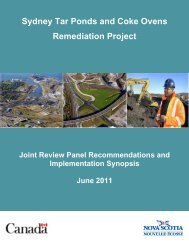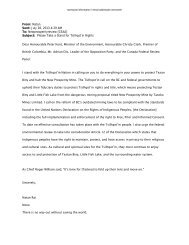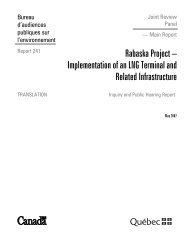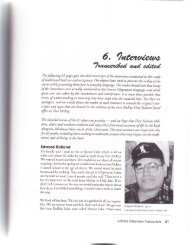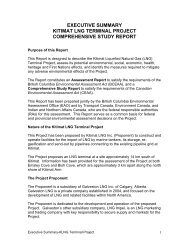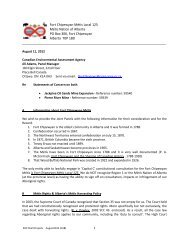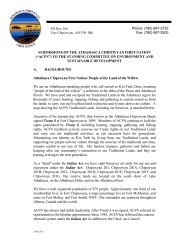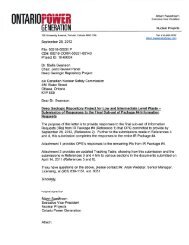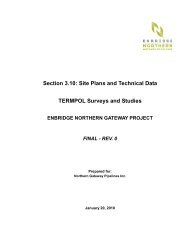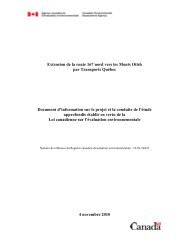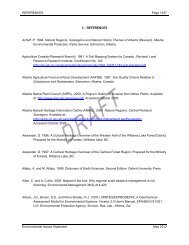From: on behalf of Panel Registry Subject: FW: TNG registration of ...
From: on behalf of Panel Registry Subject: FW: TNG registration of ...
From: on behalf of Panel Registry Subject: FW: TNG registration of ...
Create successful ePaper yourself
Turn your PDF publications into a flip-book with our unique Google optimized e-Paper software.
Climate change will not directly affect community governance but the effects it will have <strong>on</strong> the land<br />
and <strong>on</strong> community assets could certainly add more stress to governing an already challenging<br />
situati<strong>on</strong>. In the short‐term, wild fires could destroy housing and public infrastructure, which could<br />
impede<br />
the regular activities <strong>of</strong> government. L<strong>on</strong>g‐term changes due to climate change will be<br />
more<br />
gradual but they will force more systematic changes to community development.<br />
6.9. Culture<br />
The Xeni Gwet’in are the original inhabitants <strong>of</strong> the XGCA, occupying and using the land for<br />
thousands <strong>of</strong> years. Culturally they regard themselves as people <strong>of</strong> the Tsilhqot’in Nati<strong>on</strong>, which<br />
has a distinct language, a distinct system <strong>of</strong> meanings and values, a distinct kinship system and a<br />
distinct way <strong>of</strong> life marked by a blend <strong>of</strong> sub‐arctic, plateau and coastal practices. 86 The Xeni<br />
Gwet’in are unusual am<strong>on</strong>g First Nati<strong>on</strong> communities in the southern half <strong>of</strong> BC in retaining almost<br />
complete use <strong>of</strong> their own Chilcotin language and in c<strong>on</strong>tinuing to hunt, fish and collect berries,<br />
roots and medicines from the land much the same way their ancestors did. It is not an accident that<br />
the Xeni Gwet’in culture is relatively str<strong>on</strong>g. The community is remote and is not inundated by n<strong>on</strong>‐<br />
Xeni Gwet’in culture. It has its own K‐9 school, wherein the language and the culture are taught.<br />
The community makes a real effort to gather together and celebrate its culture at regular times <strong>of</strong><br />
the year. The children are taught and encouraged to ride and hunt, fish and collect. And the land<br />
has remained fairly healthy so hunting, fishing and collecting is relatively easy. Indeed, the strength<br />
<strong>of</strong> the Xeni Gwet’in culture is closely related to the health <strong>of</strong> the land, since their stories, their diet,<br />
their<br />
medicines, their seas<strong>on</strong>al movements and their social gatherings all revolve around a healthy<br />
land.<br />
Although the Xeni Gwet’in culture is relatively str<strong>on</strong>g, the culture is at risk <strong>of</strong> declining as the<br />
outside world increasingly influences the community through TV, radio, internet and c<strong>on</strong>sumer<br />
culture and as the youth travel or leave the community for work, educati<strong>on</strong> or marriage. Climate<br />
change will <strong>on</strong>ly stress the traditi<strong>on</strong>al culture further, since it will stress the land up<strong>on</strong> which the<br />
Xeni Gwet’in culture is inextricably linked. Salm<strong>on</strong> and trout fishing, to some extent hunting<br />
(moose) and collecting may become more difficult, which may negatively impact traditi<strong>on</strong>al food<br />
gathering and local self‐sufficiency. Climate change could accelerate a shift that is already occurring<br />
away from traditi<strong>on</strong>al culture, perhaps to a more agrarian culture, if farming is taken up in a bigger<br />
way, or perhaps to a more western rural culture, if store bought foods become the sole food source.<br />
There is no way <strong>of</strong> knowing how the Xeni Gwet’in culture will resp<strong>on</strong>d to the climate<br />
changes. However, what is guaranteed is that the adaptati<strong>on</strong> choices available to the Xeni<br />
Gwet’in will become fewer if the biodiversity and resiliency <strong>of</strong> the land is compromised by<br />
unsustainable development. If the land remains healthy and resilient, it will more easily<br />
adapt to the coming climate changes and the same is true for the Xeni Gwet’in traditi<strong>on</strong>al<br />
culture.<br />
7. The Xeni Gwet’in Visi<strong>on</strong> for Sustainable Development<br />
The Xeni Gwet’in see themselves as stewards <strong>of</strong> the XGCA and envisi<strong>on</strong> sustainable development<br />
and human activity, grounded in an ecosystem‐based approach to land use. The community intends<br />
to c<strong>on</strong>tinue to be to hunt, trap,<br />
fish, and collect for sustenance. They intend to ranch and guide as<br />
86 Argument <strong>of</strong> Plaintiff, Volume 1. Roger Williams vs the Province <strong>of</strong> BC. P. 175<br />
59



